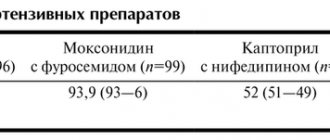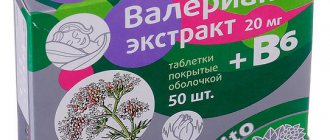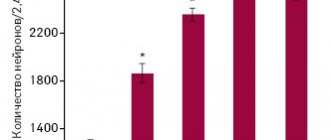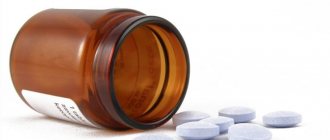Description of the dosage form
Tablets 20 mg: round white tablets, flat on one side, with a chamfer and a score and engraving: above the score - “IR”, below the score - “20”; on the other side - convex, with the engraving “SCHWARZ PHARMA”.
Tablets 40 mg: round white tablets, flat on one side, with a chamfer and a score and engraving: above the score - “IR”, below the score - “40”; on the other side - convex, with the engraving “SCHWARZ PHARMA”.
Tablets 60 mg: round white tablets, flat on one side, with a chamfer and a score and engraving: above the score - “IR”, below the score - “60”; on the other side - convex, with the engraving “SCHWARZ PHARMA”.
Kardiketa price, where to buy
The cost of 20 tablets of 20 mg is approximately 65 rubles. The price of Cardiket 20 mg for 50 tablets is about 137 rubles.
You can buy Cardiket Retard 40 mg for 104 rubles - 20 pieces, 209 rubles - 50 pieces.
For 60 mg of the drug you will have to pay 143 rubles for 20 pieces, 363 rubles for 50 pieces.
- Online pharmacies in RussiaRussia
- Online pharmacies in UkraineUkraine
- Online pharmacies in KazakhstanKazakhstan
ZdravCity
- Cardiket tablets prolonged action 40 mg 20 pcs.USB Pharma SA/Eisika Pharmaceuticals GmbH
88 rub.order - Cardiket tablets prolonged action 20 mg 50 pcs. Eisika Pharmaceuticals GmbH
122 RUR order
- Cardiket tablets prolonged action 40 mg 50 pcs. Eisika Pharmaceuticals GmbH
RUB 188 order
- Cardiket tablets prolonged action 20 mg 20 pcs. Eisika Pharmaceuticals GmbH
60 rub. order
Pharmacy Dialogue
- Cardiket-retard (tab. 40 mg No. 50)UCB/Aesica
RUB 191 order
- Cardiket-retard (tab. 40 mg No. 20)UCB Pharma GmbH/NextPharma
91 rub. order
- Cardiket (tab.prolon.effective.20mg No. 50)Alvogen/Eisika Pharmaceuticals
116 RUR order
- Cardiket (tab.prolon.effective.40mg No. 50)Labormed-Pharma SA/Eisika Pharmaceuticals
180 rub. order
- Cardiket (tab.prolon.effective.40mg No. 20)Labormed-Pharma SA/Eisika Pharmaceuticals
92 rub. order
show more
Pharmacy24
- Cardiket retard 40 mg No. 50 tablets Eysika Pharmaceuticals GmbH, Nimechchina
116 UAH.order - Cardiket retard 20 mg No. 50 tablets Eysika Pharmaceuticals GmbH, Nimechchina
80 UAH order
PaniPharmacy
- Cardiket retard tablets Cardiket retard tablets. 20mg No. 50 Germany, Aesica Pharmaceuticals
90 UAH order
- Cardiket retard tablets Cardiket retard tablets. 40 mg No. 50 Germany, Aesica Pharmaceuticals
128 UAH order
show more
Pharmacodynamics
Isosorbide dinitrate causes relaxation of the smooth muscle wall of blood vessels, thereby inducing vasodilation. Isosorbide dinitrate acts as a peripheral vasodilator, affecting both arteries and veins. These effects promote the deposition of venous blood and reduce venous return to the heart, reducing final dBP and left ventricular volume (reduce preload).
Cardiket® prolonged action is characterized by a combination of rapid onset of effect and duration of action.
The advantages of the drug are determined by the fact that the active substance contained in the Kardiketa® prolonged-release tablet quickly enters the bloodstream. As a result, the drug provides a rapid onset of effect in the treatment of angina pectoris and retains its protective effect for a long time.
Pharmacokinetics
When taken orally, isosorbide dinitrate is rapidly absorbed. Bioavailability when taken orally - 22% (first pass effect through the liver). The onset of action is after 15-30 minutes, the Cmax of the substance in the blood plasma is reached after 15 minutes - 1-2 hours. As a result of isosorbide dinitrate passing through the liver, it is metabolized to form isosorbide-2-mononitrate and isosorbide-5-mononitrate, which have T1/ 2 1.5–2 and 4–6 hours, respectively. Both metabolites are pharmacologically active. Excreted by the kidneys (almost entirely in the form of metabolites). Binding to blood plasma proteins is 30%.
Kardiket's analogs
Level 4 ATC code matches:
Nitrospray
Nitroglycerine
Efox
Monosan
Nitromint
Pectrol
Isoket
Erinite
Sustak Forte
Nitrosorbide
The closest ones: dikor long, nitrosorbide, isodinite, isoket, iso-mic .
Other analogues of Cardiket: mononitrosid, nitro, nitrogranulong, nitro-mic, Nitrospray, erinit, monocontin od, monosan, nitroglycerin, nitrocontin, nitromint, olicard retard, efox long .
Side effects
At the beginning of treatment, a headache (“nitrate” headache) may develop, which, as a rule, disappears after a few days with further use of the drug.
Sometimes, upon first use or when increasing the dose of the drug, there is a pronounced decrease in blood pressure, especially when the patient gets out of bed, which may be accompanied by tachycardia (paradoxical bradycardia is also possible), lethargy, as well as dizziness and a feeling of weakness.
Rarely - nausea, vomiting, belching, dry mouth, abdominal pain, as well as redness of the facial skin and allergic skin reactions. In rare cases, with a pronounced decrease in blood pressure, there is an increase in the symptoms of angina pectoris (“paradoxical” intensification of angina attacks).
Very rarely - collaptoid states, sometimes with bradycardia and sudden loss of consciousness (syncope).
In some cases, exfoliative dermatitis may occur.
It is possible to develop tolerance (including cross tolerance to other nitrates).
Instructions for use of the drug Cardiket
The active ingredient of the drug is isosorbide dinitrate.
A sufficient number of medicines based on nitrates have been developed on the domestic market. Internationally, isosorbide dinitrate is known as Cardiquet Vidal. Regardless of the manufacturer, the recommendations in the instructions for the drug are the same. The advantage of a big name is, perhaps, a more advanced manufacturing technology, but the active substance remains the same.
Indications for use: what does it help with?
This medicine is prescribed in the following cases:
- to prevent the occurrence of angina attacks (as basic therapy for coronary heart disease);
- for chronic failure of the pumping function of the heart (as one of the additional elements in complex therapy);
- after myocardial infarction (to prevent repeated necrosis of the heart muscle, this is called secondary prevention).
In general, indications for the use of Cardiket are limited to conditions in which it is necessary to reduce the risk of coronary vasoconstriction to prevent myocardial hypoxia.
Methods of use and dosage of the medicine
The manufacturer produces the medication in the form of tablets for internal use. They differ in different concentrations of the active substance. The use of tableted Cardiket should follow the following scheme:
| Dose of the drug per tablet (mg) | Reception scheme | Reuse | Maximum daily dose (mg) |
| 20 | 2 tablets per day (in two doses) | In 6-8 hours | 60 (3 tablets, minimum interval 6 hours) |
| 40 | 1 tablet per day | 80 (2 tablets per day, in two doses) | |
| ½ tablet twice daily | |||
| 60 | 1 tablet per day | 180 (two tablets per day) |
Extended-release capsules are available, each containing 120 mg of isosorbide dinitrate. They are prescribed once a day.
Prescription of the drug begins with minimal doses. This is due to the development of the body’s addiction to the action of nitrates, when the previously helping amount of the active substance ceases to have the desired effect. To overcome this phenomenon, it is necessary to increase the dose taken by the patient, which leads to an increase in the likelihood of adverse reactions.
The individual sensitivity of the patient’s body also plays a certain role (it all depends on the degree of activity of enzyme systems and the rate of biochemical reactions).
Since this drug is prescribed starting with minimal doses (and then increasing immediately may be required), the manufacturer has provided the ability to easily divide the tablet into two equal parts.
To do this you need:
- find a transverse stripe on one side of the tablet;
- place the dosage form on a flat and hard surface, with the dividing line facing up;
- Press the strip on top with the pad of your thumb.
It is recommended to swallow Cardiket without chewing, washing it down with clean water at a comfortable temperature. Can be used regardless of meals.
Possible side effects and symptoms of overdose
If you use the medicine more often than recommended by the instructions for use of Cardiket, you can provoke the appearance of certain symptoms:
- arterial hypotension (due to the prolonged vasodilatory effect of isosorbide dinitrate, systolic pressure may drop below 90 mm Hg);
- tachycardia (as an attempt by the body to compensate for a decrease in blood pressure);
asthenia (includes weakness, pale skin and mucous membranes, dizziness);- nausea;
- diarrhea;
- shortness of breath;
- skin redness;
- visual impairment;
- headache (due to vasodilation, intracranial pressure increases, which leads to unpleasant sensations).
When taking large doses of the drug, the pressure inside the skull increases so much that symptoms of irritation of the meninges and damage to the gray matter become possible.
Cardiket can slow down a person's reaction, which can negatively affect driving skills and lead to a traffic accident. This feature of this medication is especially pronounced in the presence of alcohol in the blood.
Side effects are similar to those of an overdose. However, the unpleasant manifestations described above occur only when the dose specified in the instructions is exceeded. But the side effect manifests itself even if all standards are observed, depending on the characteristics of the body of each individual patient.
| Organ system | Incidence of side effects | |||
| In most cases | Often | Sometimes | Very rarely | |
| Cardiovascular | Reflex tachycardia, hypotension when standing (especially after standing up suddenly) | Increased symptoms of angina pectoris, hypotension, collapse, bradycardia, syncope | ||
| Digestive | Nausea, vomiting | Heartburn | ||
| General state | Feeling weak | |||
| Nervous | Nitrate headache | Dizziness, drowsiness | ||
| Leather | Allergic reaction (in the form of a rash), redness | Vascular edema, exfoliative dermatitis (formation of blisters, and in their place - erosions) | ||
The intensity of headaches that arise as a side effect of nitrates gradually decreases with long-term use of Cardiket.
Contraindications for use
This medication should not be prescribed if the patient has absolute contraindications:
- increased individual sensitivity to isosorbide dinitrate, other nitrate compounds, or any of the excipients used for the production of the drug;
- acute myocardial necrosis (infarction), which is accompanied by low blood pressure;
- obstructive hypertrophic cardiomyopathy;
- acute increase in the volume of the vascular bed (collaptoid, shock conditions);
- dry cardiac tamponade or hemopericardium;
- constrictive pericarditis.
It is permissible to use Cardiket under close medical supervision in the following conditions (relative contraindications):
- impaired left ventricular function;
- hemodynamically significant stenosis of the heart valves;
- orthostatic disorders (jumps in blood pressure when moving from a horizontal to a vertical position and vice versa);
- anemia;
- insufficiency of liver enzyme systems;
- impaired excretory function of the kidneys;
- elderly patients;
- glaucoma (closed-angle type);
- fresh traumatic brain injury;
- hemorrhagic stroke.
Clinical studies on the use of Cardiket during pregnancy and lactation have not been conducted, and therefore in these conditions, taking this medicine is allowed only if there is an urgent need, under the supervision of the attending physician.
Interaction
It is possible to enhance the hypotensive effect of Cardiket® prolonged action when used simultaneously with other vasodilators (vasodilators), antihypertensive drugs, beta-blockers, blockers of “slow” calcium channels, phosphodiesterase type 5 inhibitors used to treat erectile dysfunction, antipsychotics and tricyclic antidepressants, procainamide , quinidine, and ethanol.
The simultaneous use of Cardiket® extended-release with dihydroergotamine may lead to an increase in the concentration of dihydroergotamine in the blood and, thus, enhance its hypotensive effect. With the simultaneous use of sympathomimetic drugs, it is possible to reduce the antianginal effect of the long-acting drug Cardiket®.
Directions for use and doses
Orally, regardless of food intake, without chewing and with a small amount of liquid.
In the absence of other recommendations, Cardiket® extended release is taken as follows:
Cardiket® prolonged action 20 mg: 1 tablet. 2 times a day. If the therapeutic effect is insufficient, the dose can be increased to 1 tablet. 3 times a day.
Cardiket® prolonged action 40 mg: at the beginning of treatment - 1 tablet. 1 time a day or 1/2 tablet. 2 times a day. If the therapeutic effect is insufficient, the dose can be increased to 1 tablet. 2 times a day. To maintain the therapeutic effect at a dosage of 1 table. 2 times a day, the second tablet should be taken no later than 8 hours after the first.
Cardiket® prolonged action 60 mg: at the beginning of treatment - 1 tablet. 1 per day. If necessary, the dose can be increased to 1 tablet. 2 times a day. To maintain the therapeutic effect at a dosage of 1 table. 2 times a day, it is recommended to take the second tablet no later than 8 hours after the first.
To split a tablet in half, place it on a hard surface with the break line facing up and press your thumb onto the tablet. It will easily separate into two halves.
Treatment should begin with the lowest doses and slowly increase the dose to the maximum effective dose. The doctor decides on the duration of treatment. This drug is intended for long-term use and should not be stopped abruptly without consulting a doctor.
Overdose
Symptoms: marked decrease in blood pressure, collapse, fainting, headache, dizziness, palpitations, visual disturbances, skin flushing, perspiration, nausea, vomiting, diarrhea, methemoglobinemia (cyanosis, anoxia), hyperpnea, dyspnea, bradycardia, cranial hypertension, paralysis, coma.
Treatment: gastric lavage; for methemoglobinemia - i.v. 1% solution of methylene blue, 1–2 mg/kg. Symptomatic therapy (epinephrine and related compounds are ineffective).
special instructions
Cardiket® prolonged action is not used to relieve angina attacks! During the treatment period, monitoring of blood pressure and heart rate is necessary. With constant continuous treatment using high dosages of Cardiket® prolonged action, the development of tolerance, as well as the emergence of cross-tolerance to other drugs of the nitrate group, is possible. To prevent a decrease in the effectiveness of the long-acting Cardiket® drug, continuous use of high dosages should be avoided. When taking Cardiket® prolonged action in patients with primary pulmonary diseases, temporary hypoxemia may occur due to the relative redistribution of blood flow to hypoventilated alveolar zones. In patients with coronary artery disease, this can lead to transient myocardial ischemia. During treatment with the drug, alcohol consumption should be avoided.
Impact on the ability to drive vehicles
During the period of therapy with Cardiket®, it is necessary to refrain from driving vehicles and engaging in potentially hazardous activities that require increased concentration and speed of psychomotor reactions.
conclusions
Cardiket belongs to the group of long-acting nitrates. It is prescribed to improve blood supply to the myocardium during angina pectoris, after a heart attack and for some other conditions.
The main side effect is headache. In routine use, hypotension caused by the drug is dangerous, especially in the elderly. The medication can only be taken if it is prescribed by a cardiologist.
There are many domestic names and imported analogues of Cardiket. The abundance of nitrate-based products indicates their effectiveness and demand.





